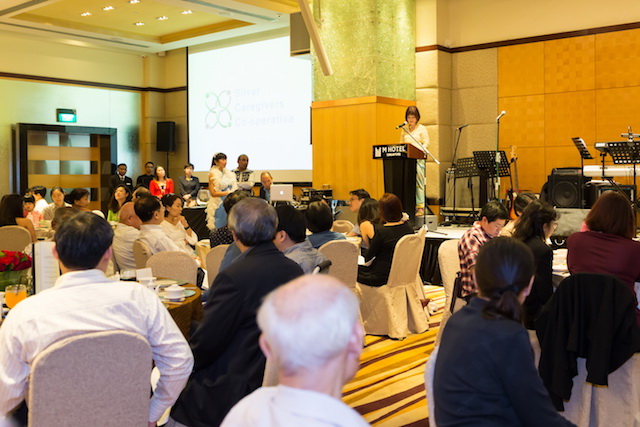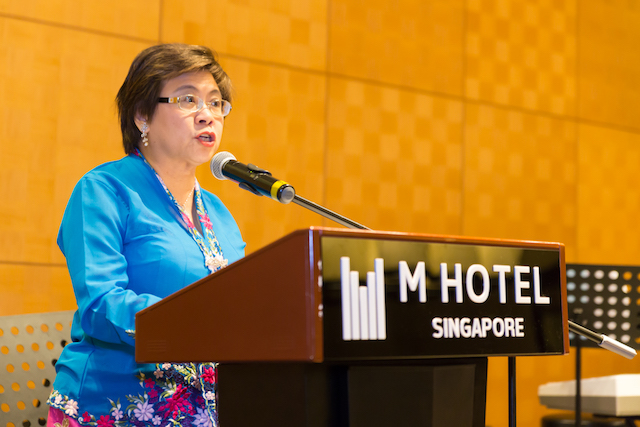A community of care
The Silver Caregivers Co-operative launches a mentor-mentee programme so new caregivers don’t have to walk alone.
BY: Eleanor Yap

The Silver Caregivers Co-operative’s annual Caregivers Celebration Dinner, where four mentors received their training certificates.
Looking back on her own caregiving journey, 58-year-old Faridah Bte Mohd Rani wished she had an experienced caregiver mentor walking alongside her as she and her family members faced many challenges. A single mother with two grown children and a grandmother of a 22-month-old baby girl, she began her caregiving journey in 1980 when her father was diagnosed with lung cancer.
She shared that even though her sister was a qualified staff nurse, her father only wanted her mother to be the main caregiver. Furthermore, her father was a very active person who loved sports especially badminton, tennis and football. With his diagnosis, all these activities had to stop and he became resentful that he was no longer physically mobile.
Shared Faridah: “He was resentful and hurtful sometimes to my mother who had to bear his temper throughout the caregiving journey. It was very tough for her especially during the last few days of his life. She had to deal with his demands alone and suffered silently as his wife. My five siblings were only able to support her by lending her their shoulder and ear to listen to her sorrow, pain and emotional anguish.”
She also saw how her family was impacted further when her brother was diagnosed in 2002 with a brain tumour at age 40 and within six months he lost his entire functional mobility, eyesight and speech. Though, the family was financially vulnerable as her sister-in-law had three young school-going children, her sister-in-law couldn’t resign from work and had to employ a foreign helper.
Faridah said, “My brother always threw tantrums whenever he was in pain, and seeing my brother suffering affected my sister-in-law both emotionally and physically. Her eldest daughter aged 12 years was always in a state of denial, and refused to visit her sick father or be near him.
“This situation affected everyone in the family as it was both frightening and unsettling as nobody knew how to cope with the grief, depression, advanced illness especially the psychosocial and emotional aspects of caregiving.”
Mentoring a novice caregiver
So, when the opportunity came to get training to become a caregiver mentor to help a new caregiver, as part of the Silver Caregivers Co-operative’s (SCCL) Mentor-Mentee Programme (MMP), Faridah was more than happy to sign up. “I want to be able to guide, support and mentor new caregivers so that their caregiving journey will be positive and less painful for the caregiver and their family members,” she said.
MMP matches experienced caregivers with novice caregivers so they can provide psychosocial and practical support to the novice caregivers, especially during the initial months of their caregiving journey. This will help the novice caregivers reduce their anxiety, stress and helplessness. The programme also allows the experienced caregivers to support the community and enhance their employability. Since there is a lack of trained caregiver mentors, SCCL hopes to later engage these experienced caregivers to be trained mentors in a curriculum to be established for Singapore Workforce Skills Qualifications (WSQ) accreditation so that mentors can gain formal certification. Besides mentors getting training, mentees also receive a two-day training, with the first one starting in April.
Faridah is one of four, who are over the age of 50, who recently graduated after SCCL’s first three-day mentor training and received their certificates at the second SCCL annual Caregivers Celebration Dinner. Talking about the training, she shared: “The Caregiver Mentor Training was insightful and provided me with the necessary skills to help my family and the community who will be responsible for looking after their elders.”
“It’s money well-spent from my personal level as I can be a mentor to family members or extended family, and to the Malay-speaking caregivers. On top of this benefit, as an administrator of SCCL, I now possess the skillset to answer enquiries on the Caregiver Mentor Training,” Faridah added.
SCCL Chairman Audrey Lee said that during the Caregivers Mentor Training, the caregivers may be experienced but still have much to learn including understanding. “We don’t want transference of guilt – maybe their baggage of guilt or anything from their previous experience – as this can affect their new mentoring experience.”
She added that overall participants of the training found their perspectives and attitudes towards caregiving changed for the better after the training. “Furthermore, apart from being better caregivers, they could build on their experience with new insights to help other novice caregivers in improving their care delivery.”
The Caregiver Mentor Training, which costs S$1,000, includes developing a close relationship with each mentee and their family, understanding the ground rules of mentoring and acquainting them with the knowledge and tools to manage a successful mentoring relationship. The mentees’ training costs S$600.
SCCL hopes to have 20 mentors trained by the end of this year, and these mentors will likely be matched with their mentees by then as well. Added Audrey: “Before the MMP becomes operational, there must be a ready talent pool of caregiver mentors. To build this ready talent pool, SCCL’s first priority is the training of the caregiver mentors. SCCL will seek to collaborate with Government agencies for example, Agency for Integrated Care’s Singapore Silver Line call centre and respite centres to match caregiver mentors to caregiver mentees who need their support and guidance for their caregiving journey.”
Loving your care recipients
SCCL’s Audrey who is also a caregiver herself to an 89-year-old father as well as an 85-year-old mother, who has dementia, said that when she started her caregiving journey, she was resentful as she couldn’t understand how the roles of care have changed. Speaking about her mother, she said: “She was a dynamic investor and very sharp, and because of her dementia, she couldn’t make decisions. For me, it was me not understanding and getting impatient, and my mom couldn’t comprehend and understand also. However, now I am much happier. I don’t get that frustrated and have learned that there are times when I am not a saviour and that it is ok when I can’t do it.”
She added: “When you think you have coped and then something else happens, you have to start all over, however, somehow you just learn to cope a little better. For instance, if a loved one passes and then you are lost.”
Being a caregiver, she recommends that new caregivers should especially continue working because “the reality of life is there are bills to pay”. “When a care recipient is discharged and if you aren’t working, what is going to happen to future bills? If you talk to your bosses, many would be willing to help you cope with the situation such as giving you half of your salary and you train another person who will be paid your other half of your salary. You are still a responsible employee in this case. If you quit, you lose a lot of things.”
Audrey said, “We want to enjoy the caregiving journey. The reason we caregive is because we love our care recipients.”
Government initiatives
The Government has already implemented a number of initiatives to help caregivers. The guest-of-honour at the Caregivers Celebration Dinner, Dr Amy Khor, Senior Minister of State for Health, shared that the Government has made efforts to enhance caregiver support in Singapore, “so that caregivers need not walk this journey alone”. “First-time caregivers are often unprepared and may not know how and where to seek help.”
She spoke about the Agency for Integrated Care’s (AIC) Singapore Silver Line call centre, which helps elderly and their caregivers navigate care services and schemes in the community. She shared that since its launch in 2014, the call centre has received more than 125,000 calls.
Dr Khor also touched on AICareLinks resource centres at five hospitals and at its office at Maxwell Road, which serves as a one-stop information and referral touchpoints providing advice on services and schemes. These centres serve on average about 4,200 patients and caregivers each month. The Health Promotion Board (HPB) also recently introduced a caregiver module in the HealthHub app. This new virtual service allows designated caregivers to conveniently access their loved ones’ health records, allowing them to keep track of their loved ones’ test results and medical appointments.
The Minister also spoke about the Government enhancing care services and schemes to support caregivers in their journey caring for their loved ones. “We have expanded our home-based care capacity from 3,800 places in 2011 to 7,500 places today, and are on target to provide 10,000 home care places in 2020. We have also expanded the number of day care places from 2,100 in 2011 to 4,000 today, and are on track to provide 6,200 day care places by 2020,” she shared.
Last year to make services more comprehensive, the Government piloted Integrated Home and Day Care packages that allow seniors to receive home and day care services flexibly depending on their needs. Seniors can come to the centres on days when they are well; and on days when they feel under the weather, providers will bring care services to the seniors’ homes instead. Dr Khor added that they hope to expand the scheme to more providers.
The Government has also enhanced the Seniors’ Mobility and Enabling Fund (SMF) to offer more subsidies for transport to eldercare centres, day hospices and dialysis centres, and subsidies to offset the cost of purchasing assistive aids and home healthcare items. There are also other schemes such as the Foreign Domestic Worker (FDW) Grant which provides S$120 each month to families who employ foreign domestic help to care for seniors at home. The Foreign Domestic Worker Concessionary Levy for these families has also been reduced from S$120 to S$60 per month since May 2015.
And for training, the Government offers the Caregiver Training Grant which provides S$200 for caregivers to attend training courses each year to better equip them with the necessary skills and know-how in caring for their loved ones. SCCL is one such training provider. The Government also started piloting last year an eldercare training scheme for foreign domestic workers.
Dr Khor ended by saying that caregiving is a “collective responsibility with the family at its core”. “Caregiving can be overwhelming, and you have demonstrated strength, courage and resilience in the face of challenges,” she said to the audience of about 290 caregivers.


0 Comments